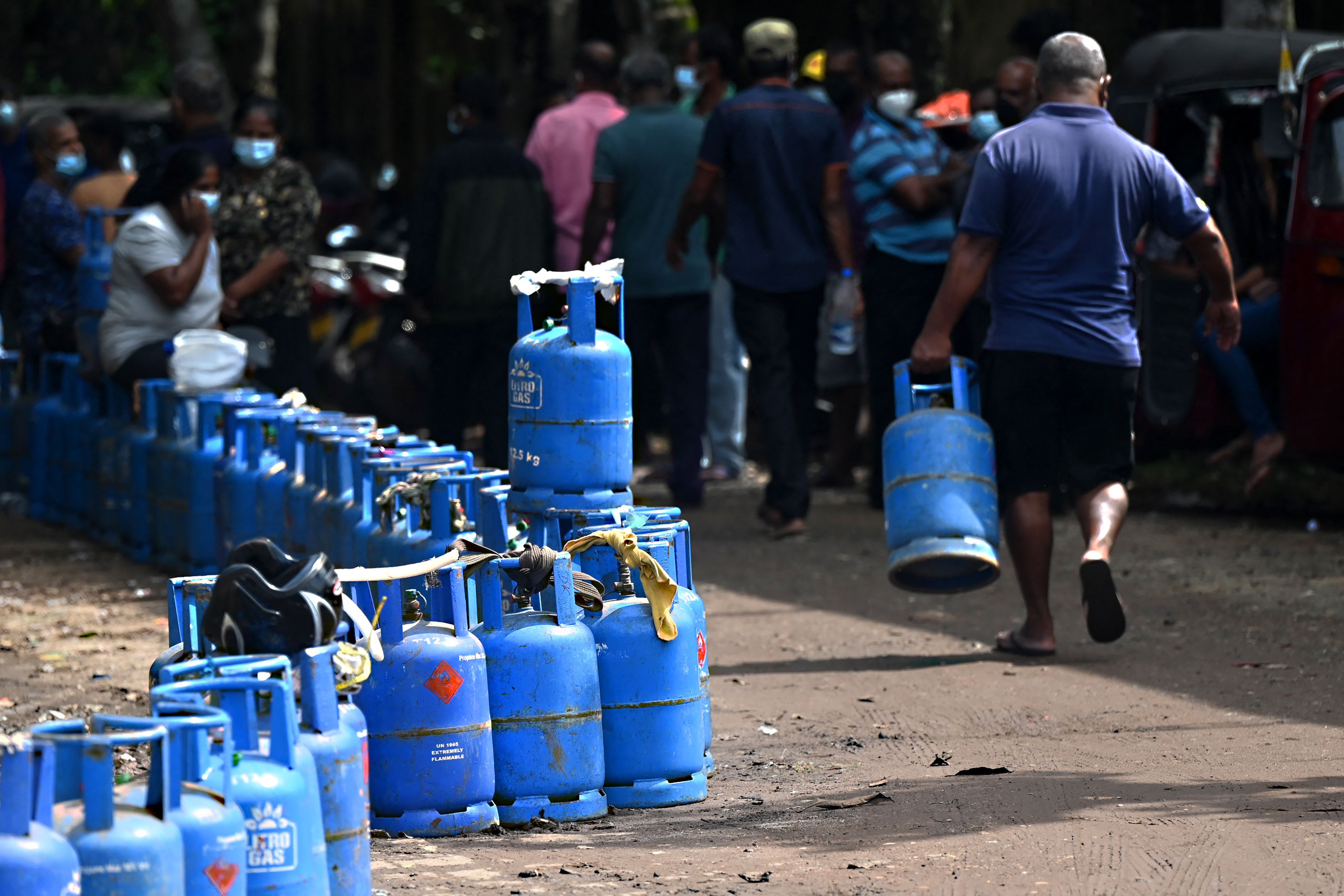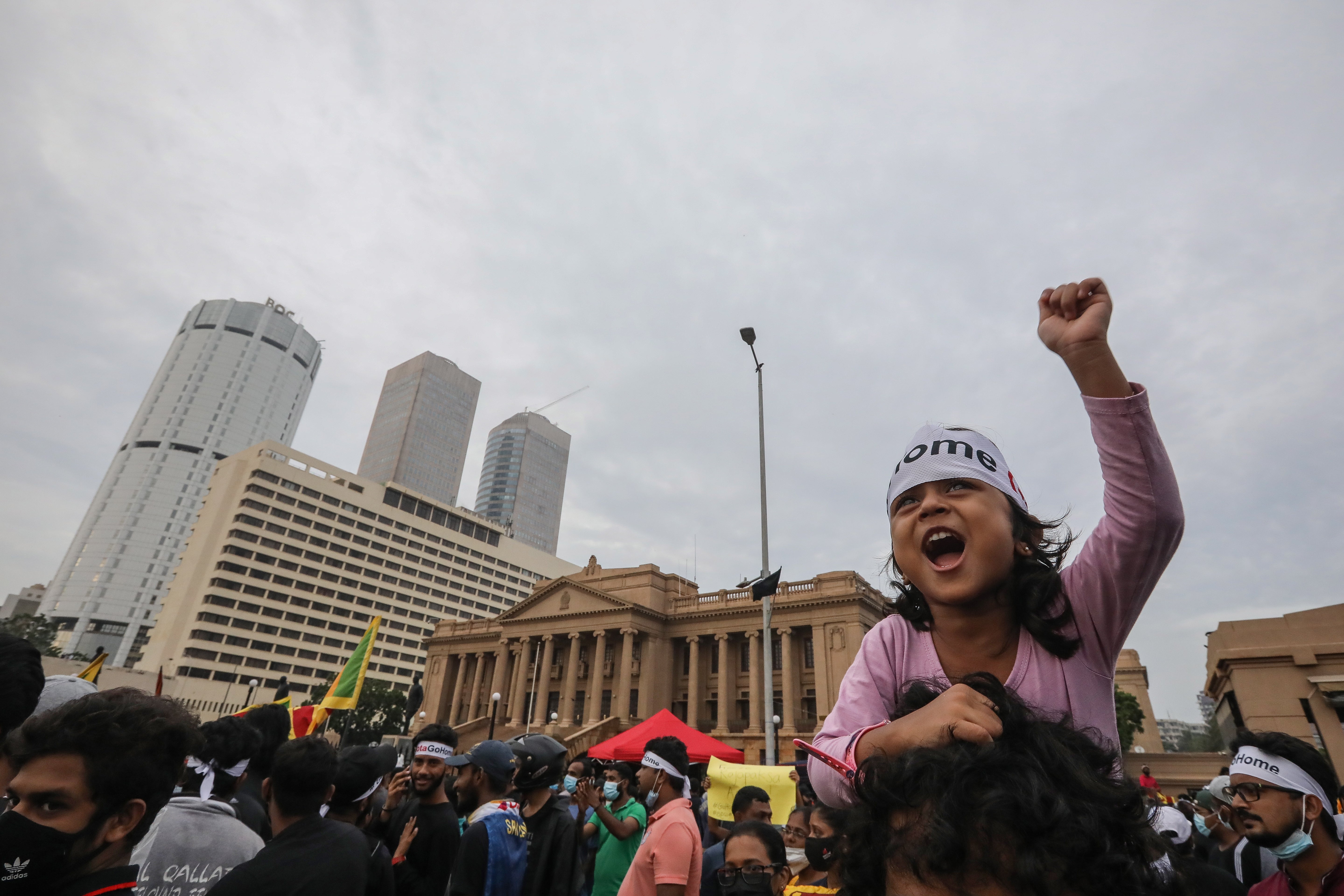Sri Lanka crisis: Why protesters are demanding end to Rajapaksa family’s rule
Protesters are blaming the Rajapaksa government for the worst economic crisis in living memory, limiting imports of essential goods including fuel, food and life-saving drugs
Your support helps us to tell the story
From reproductive rights to climate change to Big Tech, The Independent is on the ground when the story is developing. Whether it's investigating the financials of Elon Musk's pro-Trump PAC or producing our latest documentary, 'The A Word', which shines a light on the American women fighting for reproductive rights, we know how important it is to parse out the facts from the messaging.
At such a critical moment in US history, we need reporters on the ground. Your donation allows us to keep sending journalists to speak to both sides of the story.
The Independent is trusted by Americans across the entire political spectrum. And unlike many other quality news outlets, we choose not to lock Americans out of our reporting and analysis with paywalls. We believe quality journalism should be available to everyone, paid for by those who can afford it.
Your support makes all the difference.In Sri Lanka, running the country is a family affair. At the last presidential election in 2019, Gotabaya Rajapaksa claimed an easy victory, beginning his first stint as the president of Sri Lanka. But he was no stranger to politics — a year later, his brother Mahinda Rajapaksa was sworn in as prime minister for the fourth time, cementing the family’s hold on power.
The dynasty strengthened its rule further in 2021, as another Rajapaksa sibling, Basil, was named the country’s finance minister.
Now, amid the worst economic crisis since the country gained independence from Britain in 1948, many Sri Lankans have had enough. Their ire appears focused most intently on the president, whose fearsome reputation as the general who defeated the Tamil Tigers and ended a long and bloody civil war in 2009 may not be enough to save him.
Less than three years since he secured the country’s top post, the streets of Colombo are reverberating with slogans of “Go home Gota”, as many thousands of ordinary Sri Lankans have taken to the streets demanding his resignation along with all the other members of the Rajapaksa family.
Over the weekend of 9-10 April, protesters occupied the entrance to the presidential offices and received warm support from other members of the public, who brought them food and drinks to help sustain the sit-in.
The country’s financial meltdown has affected all corners of the island nation and all facets of the economy, with a severe shortage of foreign currency limiting the government’s ability to import many essential goods including fuel, food and life-saving drugs. The island state is observing power outages of up to 13 hours a day, forcing people to cook on wood, while others are forced to wait in miles-long queues outside petrol stations.
Doctors have declared a looming medical crisis, with the Sri Lanka Medical Association issuing a warning saying that sustained shortages of essential medical supplies could lead to casualties “far worse than from the pandemic”.

Critics of the government say the root of the crisis lies in decades of economic mismanagement by successive governments, and that the current emergency was all too predictable. “Sri Lanka is a classic twin deficits economy,” said a 2019 Asian Development Bank working paper, referring to a budget shortfall alongside a current account deficit. “Twin deficits signal that a country’s national expenditure exceeds its national income, and that its production of tradable goods and services is inadequate.”
Analysts say the economic crisis was accelerated by deep tax cuts that the president promised during his 2019 election campaign, months before the country’s lucrative tourism industry was hit by the Covid-19 pandemic.
In a bid to stop the outflow of foreign currency, Sri Lanka’s government in 2021 banned imports of chemical fertilisers — directing farmers to use organic fertilisers instead. The move was reversed, however, after it led to widespread crop failure and triggered a drop in output of the critical rice crop.
The country is neck-deep in debt, of which it has to repay around $4bn this year, including $1bn in international sovereign bonds (ISBs) maturing in July, reported Reuters, adding that ISBs make up country’s largest foreign debt share at $12.55bn.
Sri Lanka’s public debt has jumped to “unsustainable levels” and foreign exchange reserves of just $2.3bn were insufficient for near-term debt payments, the International Monetary Fund said in a review of country’s economy released last month.
While the Rajapaksa administration and the Central Bank of Sri Lanka have resisted calls by experts to seek IMF support, they were compelled to turn to the international body following the soaring oil prices in the wake of Russia’s invasion of Ukraine.
The Rajapaksa government has also turned to China and India for assistance, with the island nation having signed a $1bn credit line for importing essentials including food and medicine from New Delhi.

The government has scrambled to try and contain public anger, offering to form a unity government with the opposition, and last week the entire cabinet tended their resignation.
Of the ministers who resigned, three were members of the family, including siblings Basil Rajapaksa, who held the post of finance minister, and agriculture minister Chamal Rajapaksa, and the prime minister’s son Namal Rajapaksa, holding the sports portfolio.
But the opposition dubbed the resignations no more than a show of “melodrama”, and on Tuesday up to 41 MPs walked out of the ruling coalition, leaving the government with a minority in the 225-member house.
Analysts say the protests have been so hard to contain because they stem not from an organised movement but from a collective rage, prompting many to describe it as “Sri Lanka’s Arab Spring”.
"Sri Lankans are very, very patient. You’ve really got to push them into a corner before they react," Chantal Cooke, a protester holding a banner demanding that the Rajapaksas resign, told Reuters.
Describing the protests as “absolutely unprecedented”, Jehan Perera, executive director of the National Peace Council of Sri Lanka, told the Guardian the “anger and enthusiasm” against the government isn’t dying down, as he warned that “these protests are not going to end any time soon”.
“The way people from all communities are coming out onto the streets, I have never seen it before,” Mr Perera told the outlet. “And it’s happening organically, there’s no mastermind or political party behind all of this. It’s very youth-driven but you’ve got middle-class people, elderly people, wealthy businessmen, families, people who have never protested before.”

Join our commenting forum
Join thought-provoking conversations, follow other Independent readers and see their replies
Comments